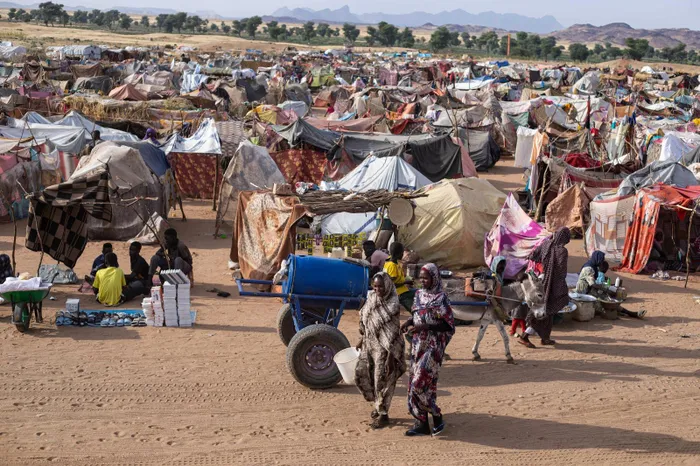Sudan mirrors politics of grievability

Displaced Sudanese who fled El-Fasher after the city fell to the Rapid Support Forces (RSF), walk in the Um Yanqur camp, located on the southwestern edge of Tawila, in war-torn Sudan's western Darfur region.
Image: AFP
SUDAN is not a crisis — it is a revelation. It is the mirror no one wants to look into, showing us what the world becomes when power sheds its old costumes and violence finds new investors.
From Khartoum’s charred skyline to the mass graves of El Fasher, Sudan is where the empire updates its software and humanity glitches.
To call this merely a “civil war” is to participate in misrecognition. Sudan is the frontline of a new imperial order: not built on flags, missions, or manifest destiny, but on ports, drones, logistics platforms, and gold smuggling routes.
If the twentieth-century empire arrived with gunboats and civilizing myths, the twenty-first arrives through private equity, military-logistics corridors, and humanitarian press releases.
The United Arab Emirates — financier, arms courier, port developer, geopolitical whisperer — is the prototype. Its fingerprints are all over Sudan’s agony, not through speeches but through shipments, bank transfers, and mercenary flows.
This is platform imperialism: power without pretense, extraction without ideology. No gospel of democracy, no civilizing rhetoric — just the cold grammar of corridors and commodities.
Sudanese gold pulled through Dubai; RSF fighters trained and paid as proxy muscle; diplomatic neutrality paired with arms shipments routed through Chad. A war economy disguised as statecraft.
And Sudan’s generals — Burhan and Hemedti — are not inexplicable villains but perfect nodes in this network: men trained not in governance but in extraction; men who discovered that it pays better to destroy a country than to build one.
They embody what I call the rationality of stupidity — not stupidity as error, but stupidity as method. Brutality becomes governance. Chaos becomes insurance. If you cannot rule a country, ruin it so no one else can.
This is why Khartoum was not “lost” — it was liquidated. Banks stripped, hospitals shelled, water systems dismantled, copper wiring ripped out of walls to sell for scrap. The destruction is not random; it is monetized. The city becomes saleable debris. A nation becomes spoils.
Yet Sudan is not only a war — it is an aftershock of revolution. The 2019 uprising, that luminous insistence on civilian dignity, terrified the region’s autocrats. As in Egypt and Syria before, counter-revolution arrived swiftly: Gulf money, military tutelage, diplomatic cover.
The lesson across the Arab world was clear — where democracy rises, Gulf patronage will fund its undoing. Sudan is the southern frontier of that counter-revolutionary project.
But while the revolution sought emancipation, the global response offered humanitarianism instead of justice. Sudanese do not need pity; they need accountability, solidarity, and sovereignty. Instead, the international system produced press conferences about aid corridors. Humanitarian grammar — all calories and cholera, no politics — imagines suffering but not liberation. It knows how to feed bodies but not how to free them. It can count the dead but not defend the living.
African governments, too, have largely met Sudan’s screams with strategic silence. This silence is not empty; it is political. It speaks in the language of non-interference, continental pride, and regime preservation.
Many African elites do not want Sudan’s revolution to succeed because it would indict their own rule. Silence becomes solidarity — not with Sudanese people, but with Sudanese generals.
And beyond the continent, the world’s apathy reveals what Judith Butler calls the politics of grievability: which lives the world believes are worth mourning. Ukraine received vigils, flags, sanctions, asylum, arms. Sudan receives occasional headlines and half-funded appeals.
The difference is not scale — Sudan’s displacement now exceeds Ukraine’s — but value assignment. Black African suffering remains filed under the tragic-but-expected. The world has learned to live with African death without feeling implicated by it.
To watch Sudan is to watch empathy rationed along racial and geopolitical lines. It is to witness a hierarchy of life where some bodies are global events and others are footnotes to a forgotten war. Sudanese are rendered ungrievable not by their humanity but by their position in a global caste system.
Beneath the rubble, Sudanese still organise mutual aid, run underground clinics, teach children in bombed-out classrooms, record mass graves, and dream of a republic that serves its people. Resistance persists not as spectacle but as daily devotion. Sudanese revolutionaries refuse disappearance.
What does Sudan demand of us? Not charity — imagination. A politics in which African liberation is not outsourced to donors, where humanitarian response is inseparable from justice, where extraction cannot masquerade as stability, and where African life is not collateral in someone else’s portfolio strategy.
Sudan is not a failure of mediation. It is the prototype of a coming world: privatised empire, militarised extraction, counter-revolution as foreign policy, humanitarianism as anaesthesia, and global indifference as structure.
The question is not whether Sudan deserves better — it is whether we will allow this model to become the future everywhere.
Sudan is the warning. The rest of us are the test.
Khan is a fellow at the Centre for Humanities Research at the University of the Western Cape.